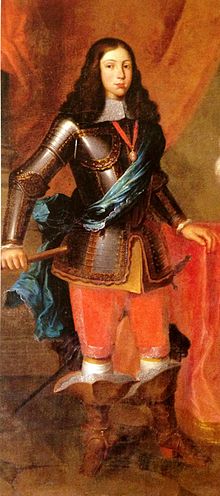Afonso VI of Portugal
| Afonso VI | |
|---|---|

D. Afonso VI; Domenico Duprà
|
|
| King of Portugal and the Algarves | |
| Reign | 6 November 1656 – 12 September 1683 |
| Acclamation | 15 November 1657 |
| Predecessor | João IV |
| Successor | Pedro II |
| Regents |
See list
|
| Born | 21 August 1643 Ribeira Palace, Lisbon, Portugal |
| Died | 12 September 1683 (aged 40) Sintra Palace, Sintra, Portugal |
| Burial | Pantheon of the Braganzas |
| Consort |
Maria Francisca of Savoy (m. 1666; ann 1668) |
| House | Braganza |
| Father | João IV of Portugal |
| Mother | Luisa de Guzmán |
| Religion | Roman Catholicism |
Afonso VI (Portuguese pronunciation: [ɐˈfõsu]; English: Alphonzo or Alphonse, Old Portuguese: Affonso; 21 August 1643 – 12 September 1683), known as "the Victorious" (o Vitorioso), was the second King of Portugal and the Algarves of the House of Braganza from 1656 until his death. He was initially under the regency of his mother, Luisa of Medina-Sidonia, until 1662, when he removed her to a convent and took power with the help of his favourite, the Count of Castelo Melhor.
Afonso's reign saw the end of the Restoration War (1640–68) and Spain's recognition of Portugal's independence. He also negotiated a French alliance through his marriage. However, the king was physically and mentally weak. In 1668, his brother Pedro conspired to have him declared incapable of ruling and took power as regent. His French wife, Queen Marie Françoise, received an annulment and married Pedro. Afonso spent the rest of his life and reign practically a prisoner.
At the age of three, Afonso suffered an illness that left him paralyzed on the left side of his body, also leaving him mentally unstable. His father created him 10th Duke of Braganza.
After the death of his eldest brother Teodósio, Prince of Brazil in 1653, Afonso became the heir-apparent to the throne of the kingdom. He received also the crown-princely title 2nd Prince of Brazil.
He succeeded his father (João IV) in 1656 at the age of thirteen. His mother, Luisa of Medina-Sidonia, was named regent in his father's will. His mental instability and paralysis, plus his lack of interest in government, left his mother as regent for six years, until 1662. Afonso oversaw decisive military victories over the Spanish at Elvas (14 January 1659), Ameixial (8 June 1663) and Montes Claros (17 June 1665), culminating in the final Spanish recognition of sovereignty of Portugal's new ruling dynasty, the House of Braganza, on 13 February 1668 in the Treaty of Lisbon.
...
Wikipedia
